Module 6(复习课件) -2024-2025学年英语五年级上册单元复习(外研版三起)
文档属性
| 名称 | Module 6(复习课件) -2024-2025学年英语五年级上册单元复习(外研版三起) |
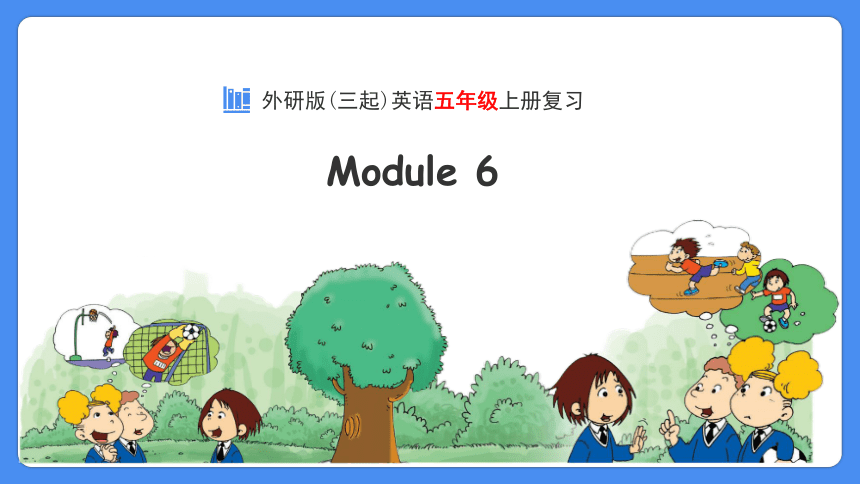
|
|
| 格式 | pptx | ||
| 文件大小 | 2.1MB | ||
| 资源类型 | 试卷 | ||
| 版本资源 | 外研版(三年级起点) | ||
| 科目 | 英语 | ||
| 更新时间 | 2024-10-14 00:00:00 | ||
图片预览

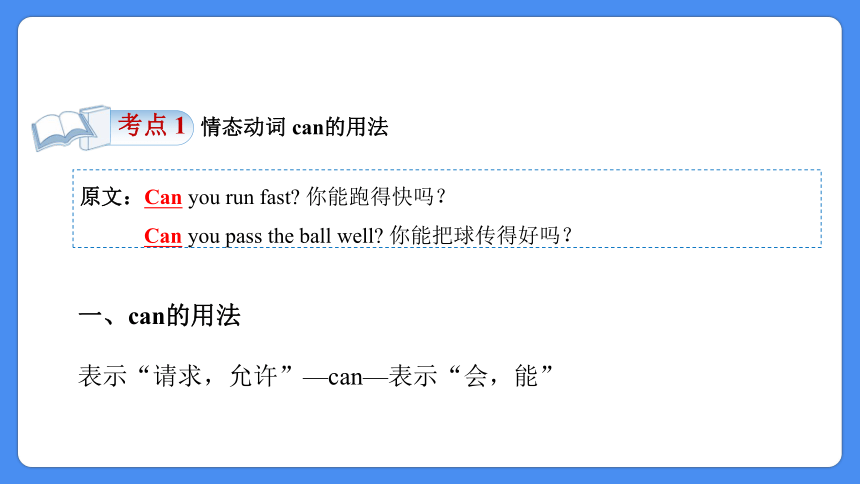
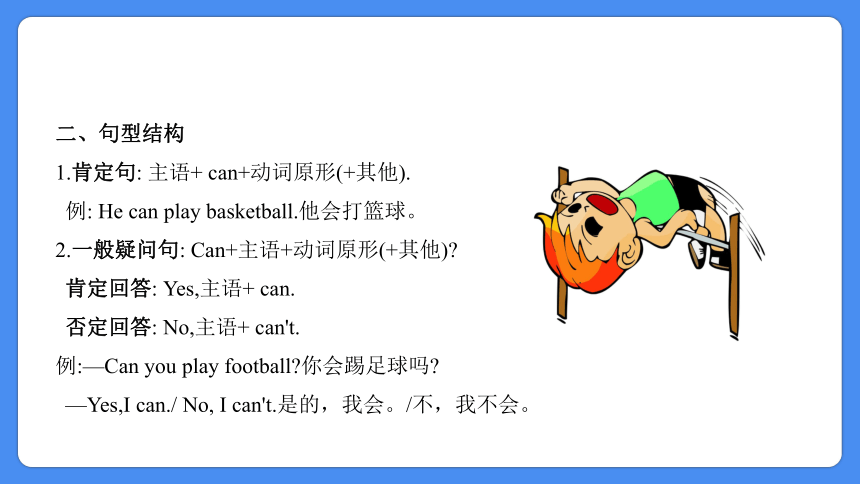
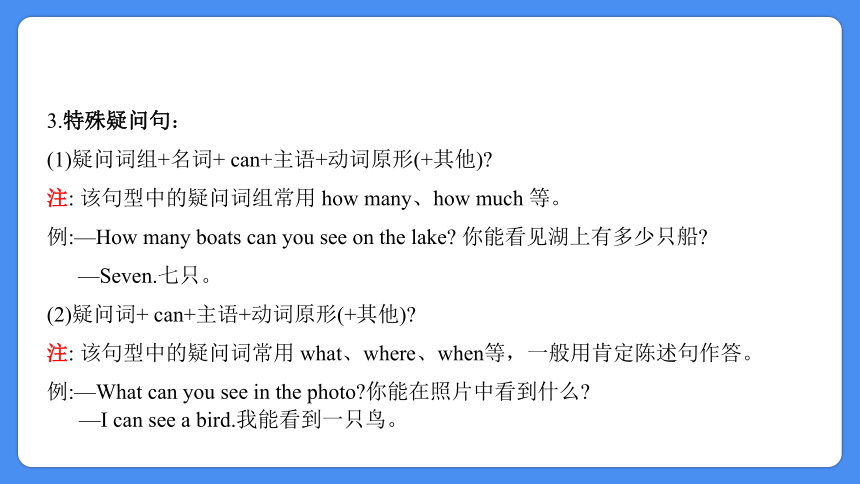
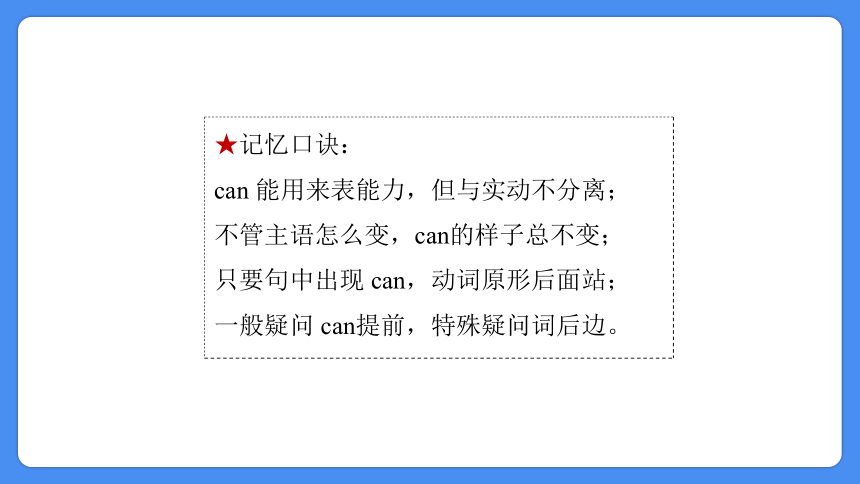
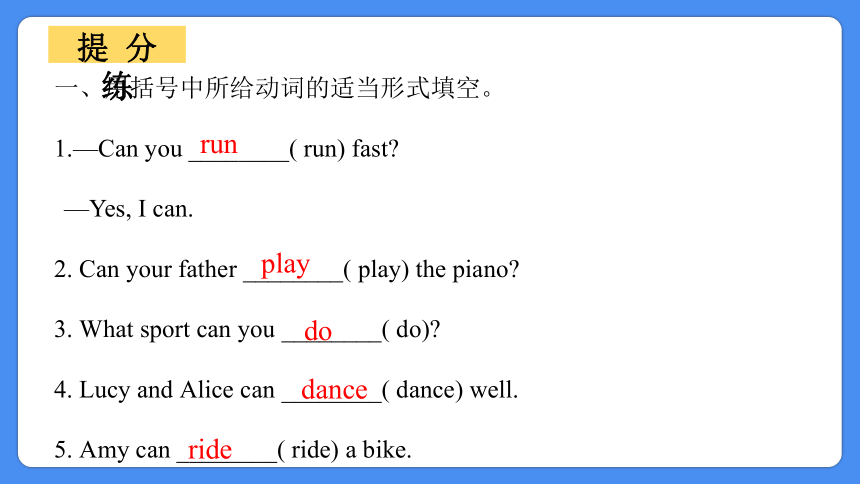
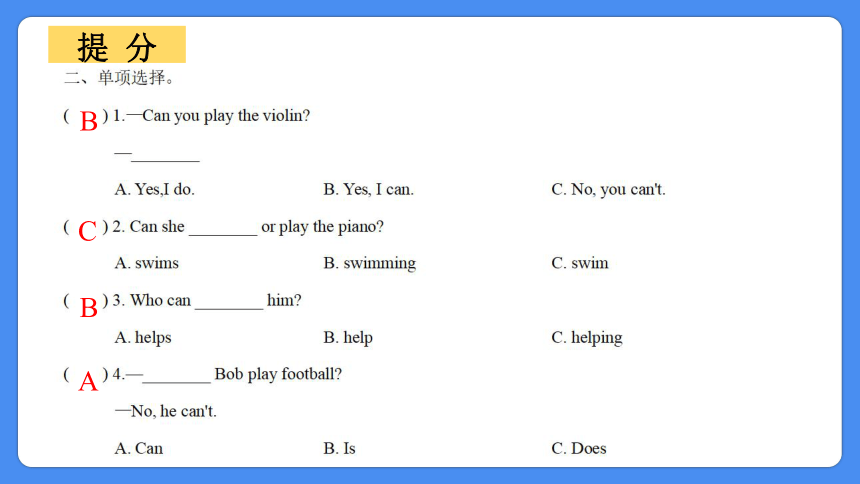
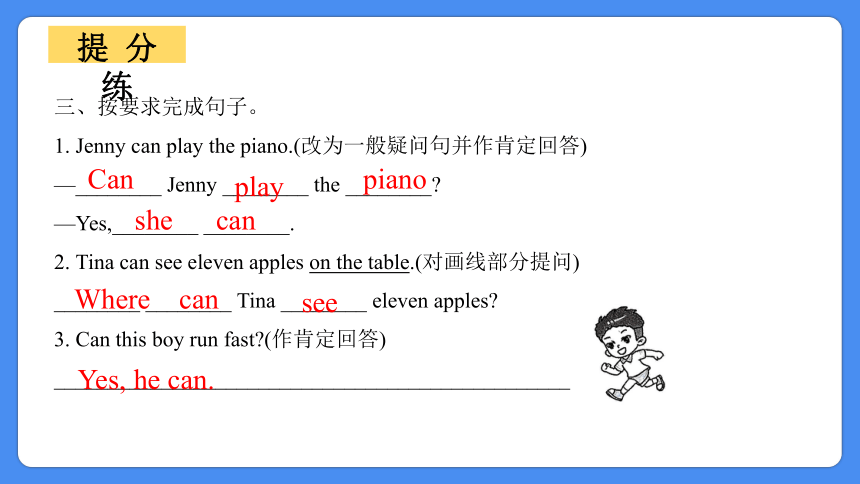
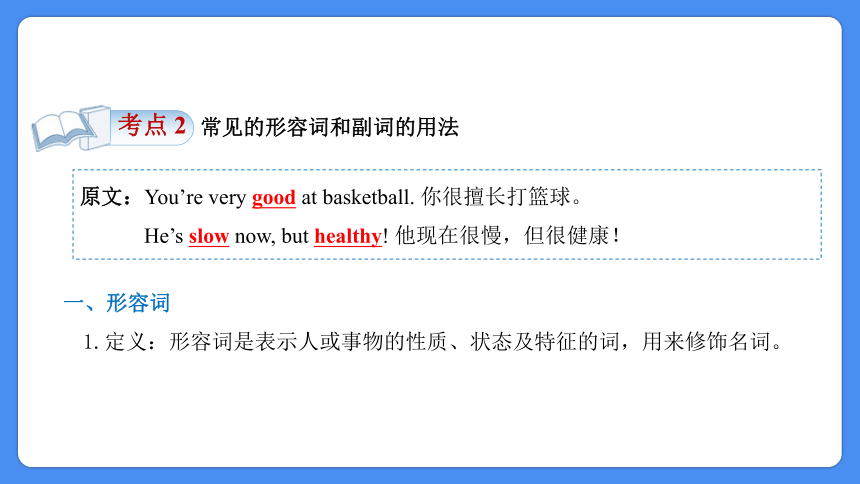
文档简介
(共22张PPT)
Module 6
外研版(三起)英语五年级上册复习
情态动词 can的用法
考点 1
原文:Can you run fast 你能跑得快吗?
Can you pass the ball well 你能把球传得好吗?
一、can的用法
表示“请求,允许”—can—表示“会,能”
二、句型结构
1.肯定句: 主语+ can+动词原形(+其他).
例: He can play basketball.他会打篮球。
2.一般疑问句: Can+主语+动词原形(+其他)
肯定回答: Yes,主语+ can.
否定回答: No,主语+ can't.
例:—Can you play football 你会踢足球吗
—Yes,I can./ No, I can't.是的,我会。/不,我不会。
3.特殊疑问句:
(1)疑问词组+名词+ can+主语+动词原形(+其他)
注: 该句型中的疑问词组常用 how many、how much 等。
例:—How many boats can you see on the lake 你能看见湖上有多少只船
—Seven.七只。
(2)疑问词+ can+主语+动词原形(+其他)
注: 该句型中的疑问词常用 what、where、when等,一般用肯定陈述句作答。
例:—What can you see in the photo 你能在照片中看到什么
—I can see a bird.我能看到一只鸟。
★记忆口诀:
can 能用来表能力,但与实动不分离;
不管主语怎么变,can的样子总不变;
只要句中出现 can,动词原形后面站;
一般疑问 can提前,特殊疑问词后边。
提 分 练
一、用括号中所给动词的适当形式填空。
1.—Can you ________( run) fast
—Yes, I can.
2. Can your father ________( play) the piano
3. What sport can you ________( do)
4. Lucy and Alice can ________( dance) well.
5. Amy can ________( ride) a bike.
run
play
do
dance
ride
提 分 练
B
C
B
A
提 分 练
三、按要求完成句子。
1. Jenny can play the piano.(改为一般疑问句并作肯定回答)
—________ Jenny ________ the ________
—Yes,________ ________.
2. Tina can see eleven apples on the table.(对画线部分提问)
________ ________ Tina ________ eleven apples
3. Can this boy run fast (作肯定回答)
________________________________________________
Can
play
piano
she can
Where can
see
Yes, he can.
常见的形容词和副词的用法
考点 2
原文:You’re very good at basketball. 你很擅长打篮球。
He’s slow now, but healthy! 他现在很慢,但很健康!
一、形容词
1.定义:形容词是表示人或事物的性质、状态及特征的词,用来修饰名词。
2.在句中的用法及位置:
用法 位置 例句
作定语 一般放在所修饰的名词前面 It's a cold and wind y day. 今天很冷并且刮风。
作表语 放在系动词的后面 He looks happy today. 他今天看起来很高兴。
作宾语补足语 紧跟宾语,放在宾语的后面 You must keep your bedroom clean.
你必须保持你的卧室干净。
注意:多个形容词修饰名词时,形容词的顺序为:描绘词→ 大小→ 形状→年龄或新旧→颜色来源→材料→类别。
★记忆口诀:美小圆旧黄,中国木书房。
3.形容词的构成:
名词 动词 +y + ly + ful + less + ese +n + al + ing + ed
cloudy, rainy lovely, friendly useful careless, helpless Japanese American, African national interesting interested
二、副词
1.定义:副词是用来修饰动词、形容词或全句的词,用来说明时间、地点、程度、方式等。
2.在句中的用法及位置:
用法 位置 例句
作状语 一般放在行为动词前 He often goes to school by bus.
他经常坐公交去学校。
作表语 某些表示位置的地点副词可放在 be动词或系动词后 He is there. 他在那儿。
3.副词的构成:
规律 例子
一般在形容词后直接加- ly real- really; quick- quickly
以辅音字母+y结尾的形容词,变y为i再加- ly happy- happily; heavy- heavily
某些以字母e结尾的形容词要先去e,再加-y或- ly。 terrible- terribly; true- truly
与形容词同形 well; early; fast
提 分 练
一、找出下列单词中不同类的一个,并将序号填入括号内。
( )1. A. candy B. now C. tomorrow
( )2. A. very B. usually C. always
( )3. A. there B. love C. well
( ) 4. A. cloudy B. Chinese C. fully
( ) 5. A. very B. quite C. nice
A
A
B
C
C
提 分 练
good
well
well
good
happily
happy
happy
happily
提 分 练
slow
slowly
beautiful
beautifully
提 分 练
三、用所给单词的适当形式填空。
1. My grandpa is old. But he is basketball. ________( health).
2. It'll be ________ ( cloud) in Shanghai.
3. The black dog is fat. It's very ________( love).
4. It' ll be ________( wind) . Take your coat.
5. We have a party. I've got ________( fun) clothes.
healthy
cloudy
lovely
windy
funny
提 分 练
C
A
C
B
提 分 练
B
C
A
B
提 分 练
五、改为同义句。
1. The snow is very heavy outside.
The snow falls ________ outside.
2. Jessica is from China.
Jessica is a ________ girl.
3. You are a good football player.
You can play football ________.
4. He isn't good at swimming.
He swims very ________.
5. This man is a real hero.
This man is ________a hero.
heavily
Chinese
well
badly
really
提 分 练
fast
well
high
good
slowly
can’t
授课人:Thank you!
Module 6
外研版(三起)英语五年级上册复习
情态动词 can的用法
考点 1
原文:Can you run fast 你能跑得快吗?
Can you pass the ball well 你能把球传得好吗?
一、can的用法
表示“请求,允许”—can—表示“会,能”
二、句型结构
1.肯定句: 主语+ can+动词原形(+其他).
例: He can play basketball.他会打篮球。
2.一般疑问句: Can+主语+动词原形(+其他)
肯定回答: Yes,主语+ can.
否定回答: No,主语+ can't.
例:—Can you play football 你会踢足球吗
—Yes,I can./ No, I can't.是的,我会。/不,我不会。
3.特殊疑问句:
(1)疑问词组+名词+ can+主语+动词原形(+其他)
注: 该句型中的疑问词组常用 how many、how much 等。
例:—How many boats can you see on the lake 你能看见湖上有多少只船
—Seven.七只。
(2)疑问词+ can+主语+动词原形(+其他)
注: 该句型中的疑问词常用 what、where、when等,一般用肯定陈述句作答。
例:—What can you see in the photo 你能在照片中看到什么
—I can see a bird.我能看到一只鸟。
★记忆口诀:
can 能用来表能力,但与实动不分离;
不管主语怎么变,can的样子总不变;
只要句中出现 can,动词原形后面站;
一般疑问 can提前,特殊疑问词后边。
提 分 练
一、用括号中所给动词的适当形式填空。
1.—Can you ________( run) fast
—Yes, I can.
2. Can your father ________( play) the piano
3. What sport can you ________( do)
4. Lucy and Alice can ________( dance) well.
5. Amy can ________( ride) a bike.
run
play
do
dance
ride
提 分 练
B
C
B
A
提 分 练
三、按要求完成句子。
1. Jenny can play the piano.(改为一般疑问句并作肯定回答)
—________ Jenny ________ the ________
—Yes,________ ________.
2. Tina can see eleven apples on the table.(对画线部分提问)
________ ________ Tina ________ eleven apples
3. Can this boy run fast (作肯定回答)
________________________________________________
Can
play
piano
she can
Where can
see
Yes, he can.
常见的形容词和副词的用法
考点 2
原文:You’re very good at basketball. 你很擅长打篮球。
He’s slow now, but healthy! 他现在很慢,但很健康!
一、形容词
1.定义:形容词是表示人或事物的性质、状态及特征的词,用来修饰名词。
2.在句中的用法及位置:
用法 位置 例句
作定语 一般放在所修饰的名词前面 It's a cold and wind y day. 今天很冷并且刮风。
作表语 放在系动词的后面 He looks happy today. 他今天看起来很高兴。
作宾语补足语 紧跟宾语,放在宾语的后面 You must keep your bedroom clean.
你必须保持你的卧室干净。
注意:多个形容词修饰名词时,形容词的顺序为:描绘词→ 大小→ 形状→年龄或新旧→颜色来源→材料→类别。
★记忆口诀:美小圆旧黄,中国木书房。
3.形容词的构成:
名词 动词 +y + ly + ful + less + ese +n + al + ing + ed
cloudy, rainy lovely, friendly useful careless, helpless Japanese American, African national interesting interested
二、副词
1.定义:副词是用来修饰动词、形容词或全句的词,用来说明时间、地点、程度、方式等。
2.在句中的用法及位置:
用法 位置 例句
作状语 一般放在行为动词前 He often goes to school by bus.
他经常坐公交去学校。
作表语 某些表示位置的地点副词可放在 be动词或系动词后 He is there. 他在那儿。
3.副词的构成:
规律 例子
一般在形容词后直接加- ly real- really; quick- quickly
以辅音字母+y结尾的形容词,变y为i再加- ly happy- happily; heavy- heavily
某些以字母e结尾的形容词要先去e,再加-y或- ly。 terrible- terribly; true- truly
与形容词同形 well; early; fast
提 分 练
一、找出下列单词中不同类的一个,并将序号填入括号内。
( )1. A. candy B. now C. tomorrow
( )2. A. very B. usually C. always
( )3. A. there B. love C. well
( ) 4. A. cloudy B. Chinese C. fully
( ) 5. A. very B. quite C. nice
A
A
B
C
C
提 分 练
good
well
well
good
happily
happy
happy
happily
提 分 练
slow
slowly
beautiful
beautifully
提 分 练
三、用所给单词的适当形式填空。
1. My grandpa is old. But he is basketball. ________( health).
2. It'll be ________ ( cloud) in Shanghai.
3. The black dog is fat. It's very ________( love).
4. It' ll be ________( wind) . Take your coat.
5. We have a party. I've got ________( fun) clothes.
healthy
cloudy
lovely
windy
funny
提 分 练
C
A
C
B
提 分 练
B
C
A
B
提 分 练
五、改为同义句。
1. The snow is very heavy outside.
The snow falls ________ outside.
2. Jessica is from China.
Jessica is a ________ girl.
3. You are a good football player.
You can play football ________.
4. He isn't good at swimming.
He swims very ________.
5. This man is a real hero.
This man is ________a hero.
heavily
Chinese
well
badly
really
提 分 练
fast
well
high
good
slowly
can’t
授课人:Thank you!
同课章节目录
- Module 1
- Unit 1 Did you come back yesterday?
- Unit 2 We bought ice creams.
- Module 2
- Unit 1 What did you buy?
- Unit 2 How much cheese did you buy?
- Module 3
- Unit 1 Where did you go?
- Unit 2 Daming took a photo of his father.
- Module 4
- Unit 1 Mum bought a new T-shirt for me.
- Unit 2 What's the matter with Daming?
- Module 5
- Unit 1 There are only nineteen crayons
- Unit 2 There are forty.
- Module 6
- Unit 1 You can play football well.
- Unit 2 He ran very fast.
- Module 7
- Unit 1 He can't see.
- Unit 2 This little girl can't walk.
- Module 8
- Unit 1 What time does your school start?
- Unit 2 Yesterday I went to Sam and Amy's school.
- Module 9
- Unit 1 Are you feeling bored?
- Unit 2 I feel happy.
- Review Module
- Unit 1
- Unit 2
- Module 10
- Unit 1 He was in the kitchen.
- Unit 2 Don't shout, please!
- 旧版资料
- Module 1 London
- Module 2 Shopping
- Module 3 At the Weekend
- Module 4 Possession
- Module 5 In Class
- Module 6 Self-assessment
- Module 7 Community
- Module 8 School
- Module 9 Feelings
- Module 10 Manners
- Review Module
